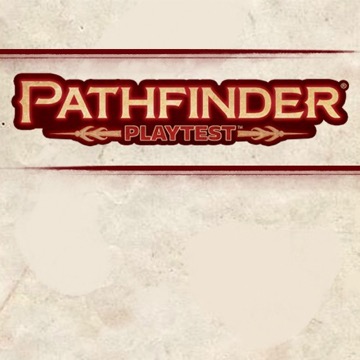The playtest of the new version of Pathfinder is well underway, and with it comes a variety of changes to the game and how it works. There are a number of parts of the game that we're looking at for revision, but we want to get a bit more data in on them first. Signature skills, ancestry benefits, and multiclassing archetypes are all under review, and some of these systems might need additional testing before the playtest process is over. As we get closer, we'll let you know what changes you can expect to see.
While we're on the topic, it's important to note that there will be other parts of the game we'll be changing between now and the final version, but that some of these parts aren't really very practical for us to test. Take the introduction to the book, for example. From all your early feedback, we've realized a number of ways in which this chapter could be improved, from including more examples to reorganizing some of the information to help folks learning the game. The team is already hard at work figuring out a better structure for the chapter and we feel that when you get the final version, the results of your feedback will really show.
While I have your attention, there's a matter of presentation that we're contemplating changing, but we want your thoughts before we do. It has to do with saving throws. Currently, there are a lot of spells and effects in the game that look something like this.
Fireball Spell 3
Evocation, Fire
Casting [[A]] Somatic Casting, [[A]] Verbal Casting
Range 500 feet; Area 20-foot burst
A burst of fire explodes, dealing 6d6 fire damage; creatures in the area must attempt a Reflex save.
Success The creature takes half damage.
Critical Success The creature is unaffected.
Failure The creature takes full damage.
Critical Failure The creature takes double damage.
Heightened (+1) The damage increases by 2d6.
The degrees of success for the saving throw are pretty common throughout the spells chapter. In fact, they're so common that we thought it might make sense to simplify the process a bit. So, if a spell or effect is one where you take half damage on a success, take no damage on a critical success, take full damage on a failure, and take double on a critical failure, we're contemplating calling that a basic saving throw. Using this sort of scheme, fireball might look like this.
Fireball Spell 3
Evocation, Fire
Casting [[A]] Somatic Casting, [[A]] Verbal Casting
Range 500 feet; Area 20-foot burst
A burst of fire explodes, dealing 6d6 fire damage to creatures in the area, depending on their basic Reflex saves.
Heightened (+1) The damage increases by 2d6.
That version is a lot cleaner and it takes up quite a bit less space, but this would be another term that players and GMs would need to learn. What do you think of this kind of approach? Let us know in the comments below whether or not basic saves are a thing you want to see in Pathfinder.
Jason Bulmahn
Director of Game Design
Join the Pathfinder Playtest designers every Friday throughout the playtest on our Twitch Channel to hear all about the process and chat directly with the team.

